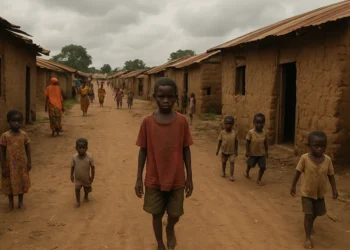Key Highlights
- Research shows that wealth is more evenly distributed in Nigeria under civilian rule than under military rule, based on the World Bank’s tracking of Nigeria’s Gini coefficient from 1985 to 2022.
- Nigeria scored 35.1% in the 2022 Gini coefficient, which ranks 11th in West Africa and 100th out of 163 countries globally.
- Nigeria’s income inequality is 1 to 14 for the top 10% to the bottom 50% of the population and 1 to 37 for the top 1% to the bottom 50%.
- The reason for the improvement in wealth distribution under the civilian rule is attributed to more politicians, their aides, and civil servants coming under the payroll of the government.
Despite widespread complaints about bad governance, research shows that wealth is more evenly distributed in Nigeria under civilian rule than under the military.
This is based on the World Bank’s tracking of Nigeria’s Gini coefficient from 1985, when Nigeria was in the grip of military rule, to 2022, 23 years into a developing democratic civilian rule.
In economics, the Gini coefficient, also known as the Gini index or Gini ratio, is a measure of statistical dispersion intended to represent income inequality or wealth inequality, or consumption inequality within a nation or a social group. A higher Gini index indicates greater inequality among high-income individuals.
The coefficient ranges from 0 (or 0%) to 1 (or 100%), with 0 representing perfect equality and 1 representing perfect inequality. Values greater than 1 are theoretically possible due to negative income or wealth.
Wealth inequality or wealth gap measures wealth distribution in a country. It is the difference between the richest and the poorest in a country or location. Wealth inequality is similar to income inequality, although wealth inequality also includes the value of bank accounts, stocks and investments, homes, and personal possessions. It’s a major determinant of an unequal standard of living.
The coefficient is arrived at by reviewing some basic economic parameters in the country. These are the GDP at purchasing power parity, poverty rate, unemployment, GDP per capita, and social spending.
Also, the Corruption Perceptions Index’s political index is considered. All these are weighted into the Gini coefficient to give the final scores.
What the Gini index says
Nigeria scored 35.1% in the 2022 Gini coefficient on countries with wealth inequality. With this score, Nigeria is 11th in West Africa and 100th out of 163 countries globally.
But the positive aspect is that it is an improvement from previous times, especially the days of the military regimes.
For example, in 1985, Nigeria’s gini index was 38.7%. This was not long after the toppling of a civilian government. By 1992, the ratio had deepened to 45% and worsened to 51.9% by 1996.
Just four years into the new civilian rule in 2003, Nigeria’s gini ratio improved to 40.1%. By 2010, it further improved to 35.7%. It further got better in 2012 to 35.5%. And although the positive development slipped to 35.9% in 2015, by 2018, the gini ratio got wider to an average of 35.1%. And Nigeria has maintained that average for the past five years and counting.
The implication is that historically, more Nigerians enjoy the country’s commonwealth under civilian rule than otherwise. But there is still much room for improvement.
Nigeria has an income inequality of 1 to 14 for the top 10% to the bottom 50% of the population and 1 to 37 for the top 1% to the bottom 50%. The implication is that one person’s income in the top 1% of the population will conveniently pay 37 persons in the bottom 50%. Income inequality between the top 1% to the bottom 50% is 1 to 37.
Nigeria’s performance on the index considered the country’s unemployment rate at 33.28%, and a poverty headcount rate of 40.09% as of the end of 2020.
Experts react to GNI report
Appraising the dividends of democracy with regard to a wider Gini coefficient, political economist, and social affairs analyst, Paul Dugu, cautioned that the reason is in civilian governments, more politicians, their aid and attendants, as well as an increased number of civil servants come under the payroll of the government; hence, wealth is naturally spread to more people.
He said that explains why the federal government’s current expenditure has far exceeded its capital expenditure.
Dugu said without that metric coming to play he doubts how Nigeria’s gini index would improve with unemployment at 33.28%.
Affirming that position, economics lecturer, Dr Jude Okojie, said Nigeria would be much better on the gini index if the economy was open and if there was less insecurity in the country. Okojie said for Africa’s largest economy, wealth ought to be much better distributed than 35.1%. He added that once the unemployment rate is reduced in the country, Nigeria would have less than a 35% wealth disparity. He however stated that the economy is a work in progress and hopes that the next administration will work better to distribute wealth more evenly.
What you should know
Across West Africa, Nigeria is ranked 11th on wealth inequality among other countries. The country with the highest wealth inequality in the sub-region is Guinea Bissau, with a coefficient of 50.7. The Republic of Benin and Ghana are second and third, with a coefficient of 47.8 and 43.5, respectively.
Globally, South Africa has the highest inequality of the 163 countries. The country recorded a coefficient of 63. South Africa maintained this score as it was also the country that topped the 2019 survey.
Nigeria has made some progress in reducing wealth inequality under civilian rule, but there is still much room for improvement. To promote more equitable growth and development, the government needs to implement effective policies to tackle wealth inequality, reduce unemployment, and improve the security situation in the country.
Nigerian businesses can also play a crucial role in promoting more inclusive growth by implementing strategies that help reduce poverty and promote economic opportunities for all. By working together, the government and businesses can create a more prosperous and equitable Nigeria for all its citizens.























I believe that the marginal decrease in inequality during the 4th republic compared to military rule is not a reason for celebration. The harsh reality is that the richest 0.003 percent of Nigerians, which is a mere 6,355 individuals worth $5 million and above, possess 1.4 times more wealth than 107 million of their fellow citizens.
These wealthiest Nigerians have enjoyed six decades of tax cuts and a tax code that has been manipulated to allow for both legal and illegal tax evasion. To combat this, implementing a wealth tax could be a solution. By imposing a 2 percent tax on millionaires, 3 percent on those with wealth over $50 million, and 5 percent on Nigerian billionaires, the government could generate $3.2 billion annually. This money could be used to double the country’s spending on education and healthcare, which would have the most significant impact in reducing inequality in the long run.